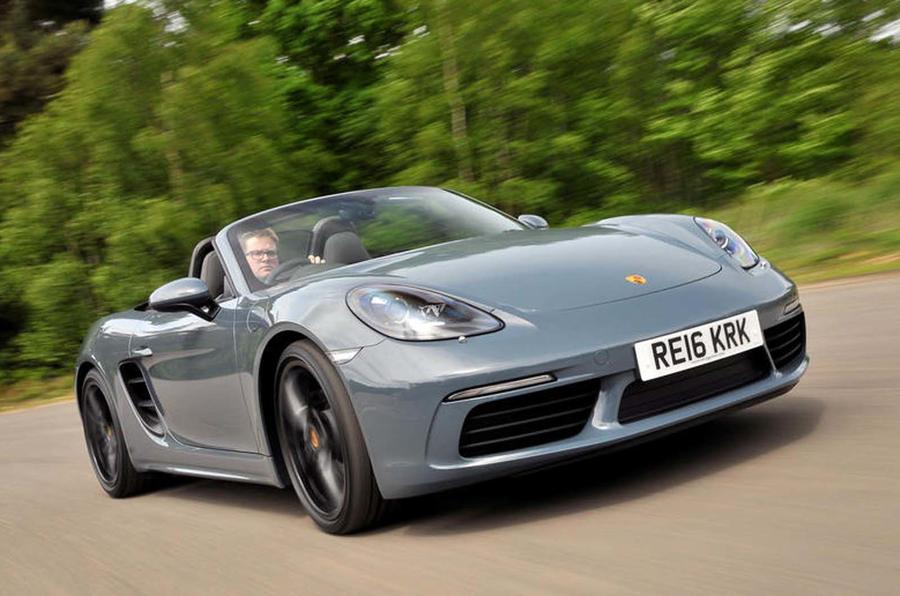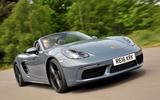Porsche is planning a battery-electric SUV and all-electric Boxster/Cayman sports car, plus a Taycan Targa, for launch by 2022 as part of its investment in electrification.
Porsche finance director Lutz Meschke revealed the plan for a battery SUV and sports car at an event in Germany last week. "You can expect a SUV BEV [battery-electric vehicle] by 2022 at the latest,” he told journalists, without elaborating further.
Meschke also told journalists that “the Boxster and Cayman could be suitable for electrification”.
Departed Volkswagen Group CEO Matthias Müller – previously Porsche’s boss – committed every group brand to having an electrified version of every model by 2023, and Porsche was no exception.
Porsche readying electric Taycan for 2019 reveal
Meschke referred to the electric utility vehicle as a “big SUV”, which would indicate a Cayenne-sized car, but the Cayenne is just a year old and not due for replacement until 2024/25. It would make a natural rival for the Tesla Model X.
To get an electric SUV to market more rapidly, Porsche is likely to focus on the replacement for the mid-size Macan – which currently shares its platform with Audi’s Q5 – as it is due for replacement around 2021. However, there are at least three other possibilities: a variant of Audi’s new E-tron SUV, a re-engineered Cayenne, or a ground-up new Porsche all-electric SUV.
Porsche is moving fast in the direction of BEVs post-Dieselgate and the new Taycan four-door has been in development for four years and will be launched in late 2019.

This month, Porsche announced that it will drop diesel from its engine line-up. This will especially affect the Macan, one of its bestselling vehicles and sold with a rich mix of diesel engines.







Join the debate
Add your comment
This is for M77rshy
The reason we want a 600+ mile range in an electric car is because life is unpredictable. Petrol stations are everywhere, pumps are pretty much always available and refills take 5 minutes. I don't want a car that will go 250 mile, maybe less with aircon etc., then have to wait around possibly for hours for it to be recharged, assuming that the charger is a) compatible and b) functioning and c) available, and if not available, so designed that there is an orderly queue. I don't want my rest stops on a long journey to be limited to places within short walking distance of a recharger. With petrol I can research good food or interesting places on the internet and build stops around that. Right now the infrastructure for an electric car only household is absolutely NOT in place, even here in California, and until it is, either we need a 600+ range or we have a second, petrol drinking car, or we accept compromises that for me kill the deal.
This is for you and other drivers that need a 600+ mile range
I presume when saying 'WE' you mean you and Peter, otherwise you make it sound like you speaking for everyone. BEV's might not be for everyone but then they don't have to be to be a success.
Tesla now outsell Mercedes in America (big country with cheap petrol) with cars that do JUST 250 miles and those owners seem to manage.
Thank you for recognising
Thank you for recognising that BEVs aren't for everyone. My point was to explain why they aren't for me, and it isn't the 250 miles (if you are lucky), it's what happens after that. I speak for myself, as you do.
I wouldn't toot Tesla's horn
I wouldn't toot Tesla's horn on range if I were Fadyady. The $36,000 Hyundai Kona has a 258 mile EPA estimated range, the $37,000 Chevy Bolt has 238 miles, the Tesla 3 in alleged $35,000 form has 220, except the $35,000 Tesla 3 doesn't exist, because they aren't making them.
Availability
Not making many Kona's available in the US for $36k either as Hyundai won't make money on them so they're limiting them in the US, limiting numbers pretty much everywhere actually.
p.s. I'm a fan of the Kona.
It will be nice to see them